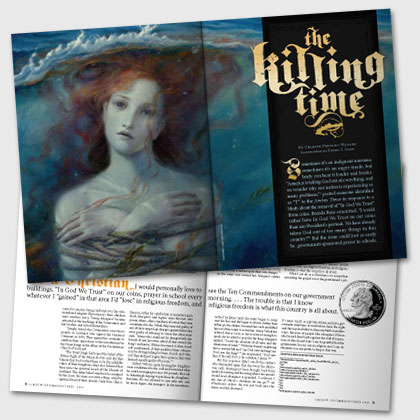The Killing Time
Céleste Perrino-Walker September/October 2009
Sometimes it’s an indignant murmur, sometimes it’s an angry tirade, but lately you hear it louder and louder. “America is taking God out of everything, and we wonder why our nation is experiencing so many problems,”1 posted someone identified as “T” to the Amboy Times in response to a blurb about the removal of “In God We Trust” from coins. Brenda Pena concurred. “I would rather have In God We Trust on our coins than any President’s portrait. We have already taken God out of too many things in this country!”2 But the issue could just as easily be government-sponsored prayer in schools, displaying the Ten Commandments on government institutions, or even swearing on the Bible in court or dispute over the phrase “under God” in the Pledge of Allegiance.
Regardless, at the heart of all such disagreements is the issue of separation of church and state, an issue that some do not seem to fully grasp and some do not agree with. But the most obvious question, surely, is Why do we want the government’s fingers in our religious pie? And the answer, quite simply, is that we are far enough removed to forget what the government does to religious pie. We have forgotten the terrible sacrifices many people have made in the name of religious freedom.
And we would do well to remember.
One of Two Margarets
what, for example, would Margaret Wilson of Wigton, Scotland, tell us about government-mandated religion? Margaret, 18, was the eldest of three children (Thomas, 16, and Agnes, 13) and the daughter of Gilbert Wilson, a farmer in the seventeenth century during a time when the king (in this case Charles II) believed himself to be the supreme ruler of the church and the state by divine right “by virtue of his royal prerogative and supremacy in causes ecclesiastical.”3 While Wilson and his wife gave the government no cause for concern, being conformists to the state-mandated religion (Episcopacy), their children were another story. Young Margaret became attracted to the teachings of the Covenanters and her brother and sister followed her.
“Simply stated, the Covenanters were those people in Scotland who signed the National Covenant in 1638. They signed this covenant to confirm their opposition to the interference by the Stuart kings in the affairs of the Presbyterian Church of Scotland.
“The Stuart kings harboured the belief of the Divine Right of the Monarch. Not only did they believe that God wished them to be the infallible rulers of their kingdom—they also believed that they were the spiritual heads of the Church of Scotland. This latter belief could not be accepted by the Scots. No man, not even a king, could be spiritual head of their church. Only Jesus Christ could be spiritual head of a Christian church. This was the nub of the entire Covenanting struggle.”4
And struggle it became. A struggle so bloody that 25 years of it were known as “The Killing Time,” a time during which men, women, and children could be shot on the spot for refusing to say “God save the king.”
Church Is State
Though Wilson and his wife were obedient to the state in matters of religion, the beliefs of their children condemned them in the eyes of the king and they were forbidden to have anything to do with their own children, who were forced to flee to the “mosses, mountains, and caves of Carrick, Nithsdale, and Galloway”5 for their own safety, though even their absence did not protect their parents. Despite their compliance they were fined for the nonconformity of their children and were reduced from comparative prosperity to destitution.
Following the death of Charles II the persecution let up for a short time and the girls decided to risk a secretive visit to Wigton to visit some like-minded sufferers in the cause, particularly their elderly friend Margaret McLauchlan. They were promptly betrayed by a man named Patrick Stuart, who requested that they drink the king’s health. The girls politely declined and he turned them in, either for satisfaction or monetary gain. Both Margaret and Agnes were thrown into prison where, after a mockery of a trial, they were condemned to die. While they were not guilty of any of the trumped-up charges against them they were guilty of refusing to swear the abjuration oath. “Many who could not be charged with the breach of any law were asked if they owned the king’s authority. If they disowned it, they stood self-condemned; if they qualified their submission by distinguishing between church and state, or if they declined to give their opinion, they were deemed equally guilty of treason.”6
Gilbert Wilson, upon hearing his daughters were condemned to die, sold and borrowed what he could, managing to raise 100 pounds. He rode to Edinburgh hoping to purchase his daughters’ freedom. He was allowed to save only one, and he chose Agnes, the youngest. In the meantime, Margaret Wilson’s friends did everything in their power to save her by trying to cajole her into swearing the abjuration oath or making a promise to start attending the government-sponsored church, but she refused to alter her course through compromise no matter what the cost.
The Solway Martyrs
On May 11, 1685, though reprieve had been requested for His Majesty’s pardon and was expected to come in some form—if not a pardon perhaps a lighter sentence—the two Margarets were led from their prison by Major Windram and a company of soldiers to where the Blade River meets the sea (an arm of the Solway Firth) and led out to the wide sands that are covered twice a day by the tide. There they were tied to stakes in the sand to await drowning by the tide. The elder Margaret was tied farther out so her young companion might watch her slow death and—they hoped—be frightened into a change of conscience. But Margaret refused to be moved. While her friend struggled, drowning, a heartless bystander asked her what she thought of the sight.
“What do I see,” she answered, “but Christ, in one of His members, wrestling there? Think you that we are the sufferers? No, it is Christ in us; for He sends none a warfare upon their own charges.”7 As the water rose around her, Margaret calmly recited Scripture until the water began to creep over her face and she began to drown. Rather than let her go, the soldiers loosened her cords and lifted her out of the water to revive her. Major Windram ordered that as soon as she recovered enough to speak she be asked to pray for the king. Margaret replied, “I wish the salvation of all men, and the damnation of none.”8 With her friends imploring her to save her life and “say, God save the king! say, God save the king!”9 she responded, “God save him, if He will, for it is his salvation I desire.”10
But this response didn’t satisfy the soldiers who demanded again that she swear the abjuration oath. Having just been brought back from nearly drowning and knowing where her answer would lead, Margaret responded, “I will not; I am one of Christ’s children; let me go.”11 At Windram’s orders she was put back into the water, and she drowned.
“Readers of the tragic story may thus be assured that the refusal of firm Covenanters to say ‘God save the king’ was not the result of any lack of true civil loyalty to ‘the powers that be that are ordained of God,’ but solely the result of an enlightened conscience which refused to give to man, no matter how highly exalted in office he might be, the honor due to the Lord’s Anointed. When such persons as the Solway martyrs [‘the two Margarets’] refused to say ‘God save the king,’ it was because of the meaning given to the expression by men in authority. Its use was tantamount to confessing that the king was supreme earthly ruler in the Church of God. The Covenanters chose death rather than life when impaled on the horns of the dreadful dilemma.”12
Full Circle
As a Christian I would personally love to see the Ten Commandments on our government buildings, “In God We Trust” on our coins, prayer in school every morning. I’d love to know that public school teachers could openly share their faith as part of their job. The trouble is that I know whatever I “gained” in that area I’d “lose” in religious freedom, and religious freedom is what this country is all about.
What I can do, as a Christian, is to accept that spreading the gospel is not the government’s job. It’s mine. And I, as a private citizen and not a government employee or institution, have the right and the responsibility to share my faith in endless ways. Because of people like Margaret Wilson who braced their backs against the wall of separation of church and state I can be grateful that the government has no say in religion and I can do whatever is in my power to keep it that way.
- http://amboytimes.typepad.com/the_amboy_times/2006/11/in_god_we_trust.html
- Ibid.
- www.ianpaisley.org/article.asp?cov_intro.htm
- www.covenanter.org.uk/WhoWere/
- www.applesofgold.co.uk/the_two_margarets.htm
- www.ianpaisley.org/article.asp?cov_intro.htm
- www.applesofgold.co.uk/the_two_margarets.htm
- Ibid.
- Ibid.
- Ibid.
- Ibid.
- www.ianpaisley.org/article.asp?cov_intro.htm